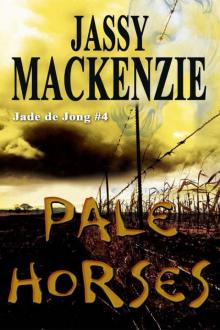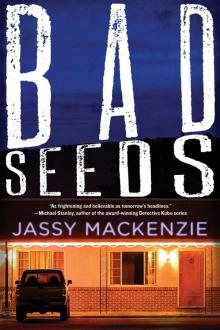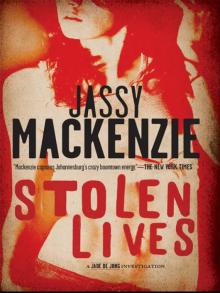- Home
- Jassy Mackenzie
Random Violence Page 2
Random Violence Read online
Page 2
David looked down at her with his strange eyes, so oddly pale in his brown-skinned face. He took her hand in a gentle grasp. And then he smiled.
At that exact moment Jade changed her mind about him.
With David there, Turffontein didn’t seem like such a bad place after all. And when she spent time talking to him about his job, Jade thought she might have been wrong about a career in the police force, too. Crime-fighters were heroes.
At least, David made it sound that way. But when she’d told him she had changed her mind about being a lawyer, he dis-couraged her from joining the police.
“As a woman you’ll be limited, Jadey,” he told her. “You’ll be kept in an admin position for so long you’ll start to grow mold. Why don’t you become a private investigator? That way you can be your own boss. Run your own show, work with the cops.”
Jade liked the idea of working with David. And she had never wanted to grow mold. So she took his advice.
David walked into the well-tended garden with her. Now that she wasn’t trying to watch the road for him, she had a chance to look at him properly.
She had expected that time would have stopped while she was away, that David would look the same as when she’d last seen him. He didn’t.
His face was thinner and careworn, his forehead furrowed, his body more solid. Looking closely, she saw white strands gleaming in his dark hair. He still reminded her of a merce-nary, but now it looked as if his fight had been harder and his victory more narrow.
She saw he was staring at her, too. She wondered what he was thinking.
“You haven’t changed a bit, Jadey,” he said. “You still look so damn good.”
He was being kind, she knew, although she was encour-aged by the unbrotherly tone of the compliment. She was thirty-four now. She had smile lines and tiny crow’s feet around her eyes. Her hair was darker brown than it had been; she’d started dyeing it last year when she’d spotted the first evidence of gray. She was still slim and wiry though. Like her father she had a ridiculous metabolism that allowed her to eat whatever she wanted and stay that way.
She smiled up at him.
“You haven’t changed, either,” she said.
She could be kind, too.
They strolled over to a railway-sleeper bench in the shade. He thumped his weight down on the wood, and patted the seat next to him. Jade joined him. The bench was punish-ingly hard on her backside, still numb from the eleven-hour flight.
David gazed at the view. She thought he looked puzzled, as if he couldn’t believe that it was as real as the crime and brutality that he saw in his working life.
“The case. Could you help me with it?” he asked.
“Of course.”
“I can’t pay you. We’ve got no budget.”
“You can owe me.” Jade watched a bird with a luminous turquoise breast hop along the grass towards the bench. It stared at them, inquisitive. Then David bent to adjust his shoelace. Startled by the movement, it flew up to a safe perch on the branch of a syringa tree.
“If you were thinking of coming back permanently, it would be a good kick-start for your career,” he added.
“Yes, it would.”
“Why the hell did you disappear, Jadey?” He looked at her, his pale gray eyes keen and sharp under his elegant brows. “I’ve often wondered. You left the country so suddenly, you didn’t tell anyone where you were going. What happened?”
Jade chose her words carefully. Not because David was a top-notch investigator who might pick up the slightest whiff of falsehood. But because he was her friend. She didn’t want to lie. Equally, she couldn’t tell him the truth. Not now. Not ever.
She settled for saying, “It was to do with my dad, mostly.”
He nodded, as if he’d been expecting her to say that. She was worried he’d question her further, but to her relief he looked at his watch and stood up.
“I’d better get going now,” he said. “Or else I’ll be in more trouble.”
They went back to the car. David took her suitcase out of the trunk, together with a beige folder containing a slim sheaf of papers.
“This file contains everything on the case so far.”
“Thanks. I’ll look at it now.”
He slammed the trunk shut. “And this car is for you. I hired it on your behalf. It’s a good choice, I think. Inconspicuous.”
Jade ran her hand along the hood. “Great choice, David. Thank you very much.” It was small and white, so inconspic-uous she didn’t know how she would ever find it again if she walked away from it in a car park.
She buzzed the gate open for David and watched him jog the short distance to the house next door. He ran up a flight of outside stairs to a room above the garage, reappearing a minute later with a tie in his hand, climbed into the unmarked vehicle in his driveway and headed down the road, honking as he passed her cottage.
She hefted her bag into the bedroom. The cottage was fur-nished, although the décor was too chintzy and frilly for her taste. She drew the line well before heart-shaped scatter cush-ions and lacy toilet-roll holders. But it had what she needed. Steel security gates, burglar bars on all the windows and an alarm system that was linked to an armed response company.
Jade walked outside to her car.
She’d get to the case file as soon as she could. But first she had more urgent business, on the wrong side of town.
3
The industrial section nestled behind Johannesburg’s inner city had boomed in the early 1900s during the gold rush, and slumped into seedy decay when the last of the surrounding mines had closed. Now, Jade discovered, it was back in busi-ness again. The traffic was worse than she remembered. Streams of hawkers threaded their way in between the queues of cars selling newspapers and squeaky toys, beanies and sun-glasses, batteries and replica perfumes. Jade wound down her window and bought a bottle of mineral water from a dread-locked man wearing a Coca-Cola T-shirt.
The place she was looking for used to be a warehouse with a sad empty plot lined with vicious-looking weeds on one side and a dilapidated building on the other. Now it was one of twenty warehouses. Jade recognized it just in time.
She stamped on the brakes and honked in front of the big metal gate. A faded sign outside read “Auto Parts.” She guessed it hadn’t been repainted since she was last here.
A man wearing dirty blue overalls came out to meet her. He was tall and gangly, with a dark olive complexion. The black peppercorn curls on his head had been bleached orange-blond. The effect was garishly amateur. Beneath it, his nose showed the signs of a botched re-setting, and his eyes were hard and wary.
She got out of her car.
“Robbie.”
“Jade.” He wiped his oil-stained hands on his overalls before giving her a hug. “Good to see you.”
They walked into the warehouse.
Jade looked around. It was so cold her breath steamed in the air. A receptionist was sitting at the table inside the door. She had long dark hair and was wearing tight pink jeans and a fluffy hooded jacket that zipped up. The zip wasn’t pulled up very high, and she didn’t seem to be wearing anything under the jacket. She looked like the prize performer at an Eskimo strip club.
“That’s Verna,” Robbie said.
“Hi, Verna,” Jade said.
Verna smiled back at her. Jade thought she probably smiled even wider for men.
Inside the place was surprisingly clean and tidy. The steel shelves were stacked with parts. She wondered how many were new and how much came from cars that had been stolen. There was a strong smell of oil in the air.
Robbie’s office was at the back, protected by a sturdy secu-rity gate. He took out a set of keys and unlocked it.
“How’s business?” Jade inquired.
“Never been better.”
“I’m sure Verna is good for sales.”
Robbie smiled. “She’s good for lots of things. And for sales.”
He pulled up a chair for Jade and pun
ched a button on a CD player. Whitney Houston came crooning out of the loudspeakers. Jade was pretty certain that the CD player was stolen, and if the album had been anything else, she would have guessed it was pirated, because that was Robbie’s way. But why anyone would want to pirate Whitney Houston was beyond her.
“Coffee?” he asked.
“No thanks. I had some on the plane.” She hadn’t forgotten the taste of Robbie’s coffee. It left a lasting impression. She wasn’t willing to gamble on the possibility that he might have learned how to make a better cup since they’d last seen each other.
Social obligations over, they got down to business.
“So. Same again?”
“Same again.”
Robbie nodded. “Thought so.” He pulled open the desk drawer and took out a gun. He winked at her. “This is the best I’ve got.”
It was a Glock 19. Compact, black, stubby and functional, with a simple but brutally efficient design that always made her think of a shark. Her fingers closed around the ridged grip and she felt it nestle into her palm. It felt hard and cold and familiar. She looked at it more closely. It was very familiar. It had a C-shaped nick on the barrel that she’d been in the habit of running her fingers over the last time she owned it.
“Robbie.”
“Yes?”
“This is the same gun.”
“Am I good or what?”
She frowned at him. “You promised to get rid of it. You said nobody would ever be able to find it.”
“What’s your problem, Jade? Nobody did find it. That’s why it’s here now. I kept it safe for you. Oiled, that sort of thing. Nobody’s used it since then, I’m not that daft.” He ran a finger over the barrel. “It’s a good piece and I didn’t want to get rid of it. You know, for me, a Glock is a cultural weapon. One of my grandfathers was Austrian, which I’m sure I’ve told you before. That’s where my white genes come from. The Nazi side of the family.”
“You told me your grandfather was Irish.”
“Oh. Well, I was trying to get into your pants then. Irish sounded better.”
Jade sighed. “What if the Scorpions had raided you?”
“They didn’t. I haven’t had a problem with any of the cops recently. And if they had, they wouldn’t have found it. I didn’t keep it in the damn desk drawer the whole time, you know.”
Jade ran her fingers over the nick again.
“You were supposed to throw it away for me.”
“In a week or so you can do what you like with it. Go out on a paddle ski and chuck it in the middle of the Vaal Dam. Bury it on a mine dump. Whatever.”
Jade looked down at the Glock. The grip felt cold and clean in her hand, as if it had never been exposed to the hot sweat on her palms that left wet streaks on the hard black plastic the last time she had touched it. The gun had done its job. Afterwards, she’d never wanted to see it again. She felt uneasy holding it now.
“Robbie, I don’t want this one again. It’s too risky. I’d prefer another piece.”
“You think I know the history of everything that comes in here? You want me to sell you something that was used to shoot some bloody kid in a robbery? If they don’t catch you, nobody’ll be any the wiser. In any case, it’s the only suitable one I have right now.”
He grinned, and yet again Jade was reminded of a shark.
“There’s too many people dealing in guns. It’s not a prof-itable business any more. Or a safe one. So I don’t do it much. I’ve got a damaged piece I wouldn’t sell to you, and the only other one’s a Desert Eagle. You can have it if you want, but you won’t even be able to get your hand around the grip.”
Jade shook her head. “That’s not an option, then.”
“I won’t charge you for the Glock. You bought it off me once already. I won’t even charge you storage.” He slid a cloth bank bag across the desk. “Give me five hundred rand and you can have this lot. Holster, extra mags and a stack of ammo. If you run out, it’s because you’ve pissed off too many people. Not because I short-supplied you.”
Jade counted out five notes. The currency felt unfamiliar in her hands. She saw a blue line drawing of a gloomy-looking buffalo head on the topmost note. Then Robbie’s fingers covered it as he swept the money towards him and shoved it into the drawer.
“There we are then. Done deal. You can smile, you know. Be happy. You got your old weapon back. It’ll work for you again. You watch.”
She picked up the bag of ammunition, feeling its weight.
By sitting here with Robbie, holding an illegal, unlicensed firearm in her hand, she knew she was betraying David. But unless she went through with what she planned to do, she couldn’t help him with the case. It would be too dangerous. Because Viljoen would learn she was back.
Viljoen, the convicted murderer who’d spent the last ten years of his life locked away in a high-security prison cell while Jade roamed the world. She’d timed her return per-fectly— he was due to be released in a couple of days.
She snapped a magazine into place. In his own way, Robbie was right. There was nothing that made this gun different from any other. It was a machine designed to kill people. No more, no less. In a few days it would be able to fulfill its func-tion and get rid of somebody who’d deserved to die a long time ago.
“So.” Robbie continued, drumming his fingers on the table in a frantic rhythm that bore no relation to the slow love song playing in the background. “Plan’s going ahead?”
“Yes. As soon as Viljoen’s out. Do you still want to help?”
“I promised. I always keep my word.”
The way he said it reminded Jade of the first time she’d met him, ten years ago, in the cigarette reek of the Hill-brow nightclub. They’d sat on a cracked leather sofa, their faces almost touching. They must have looked as intimate as lovers. She shouted in his ear over the pounding music. Who she was, what she wanted, why she was on the run. Why she was desperate.
When she’d finished, he shifted back on the couch and looked at her for a long moment. Then he leaned close and shouted, his lips against her ear.
“I don’t think you’re a cop, OK. The cop chicks I’ve seen are all pig-ugly Afrikaans women. But I’m giving you one chance now. If this is a set-up, walk away. Because if I find out you’re trying to screw me around, I’m going to come after you and I’m going to kill you. That’s a promise. And you’d better believe it. I always keep my word.”
She had stayed. And she believed him then, just as she believed him now. She didn’t know if Robbie always kept his word. But she knew he did when it came to killing people.
4
Jade jerked awake in the early hours of the following morning, gasping for breath and scrabbling under the pillow for her gun. Her heart was hammering, and in spite of the room temperature being uncomfortably cold, her hair was damp with sweat.
She sat up in the dark, her fingers curling around the grip of the gun as her nightmare dissolved. The feel of the hard plastic didn’t reassure her. It was a stark reminder of what she had done, and why she was back.
Jade swung her legs off the bed and stood up. Was it the dream that had woken her? Or something else?
She could hear the trill of crickets, and the far-off rum-bling of heavy trucks on the highway, travelling through the night. Closer to home, she heard dogs barking. Why were they barking in the small hours of the morning?
She unlocked her bedroom door and walked towards the kitchen, the cold tiles stinging her bare feet.
The security light outside the kitchen window cast dark shadows onto the floor. Jade padded over to the window and looked out. She could see the gleam of the metal body of a car. It was parked on the road outside her house, headlights off. Somebody was watching her.
She tensed, and dropped down to her knees. If she could see the vehicle outside, could the driver see her?
While she was crouching on the floor, she heard the scrunch of wheels. The car was moving off. Straightening up, she saw it pull away,
the shadows patterning its side.
She took a deep, shuddering breath. It could have been opportunistic criminals checking out a newly arrived resi-dent. She didn’t think so, though, but she didn’t know why.
Jade turned on all the lights and checked the cottage thor-oughly. The front door was secure. The alarm was armed. The battery box that fed the electric fence was beeping quietly, its green light flashing.
She got back into bed and lay there listening until the traffic noises grew louder and the birds began to sing and the sky turned from black to gray.
Annette Botha had died almost immediately after the first bullet hit her. According to the coroner’s report, her chest had been penetrated by one of the two .45 caliber bullets that hit her. It had burst the aorta, causing a massive rupture. The gush of her blood had flooded her heart, stopping it instantly.
The other shot, to her throat, had torn open her carotid artery. That would have been fatal on its own.
Jade had set up a temporary office in the kitchen, where she could see the road outside. Even with an oil heater next to the table, the room was freezing. Chilly air seeped through the gaps in the door and window frames, dispersing the heat as soon as it was produced.
She turned the page and took a sip of coffee. She’d found bread, butter and cheese in the fridge. And two bottles of Tabasco in the cupboard. David’s contribution, she was sure. She was having cheese on toast for breakfast, liberally dotted with Tabasco.
The two bullets had been fired from an estimated distance of around six meters. So, Annette’s killer knew how to shoot. There were plenty of gun-carrying criminals in South Africa who didn’t. They only used them for show, to scare. To be certain of killing somebody, they’d have to fire from point-blank range. At six meters, in the stress of the moment, some-body unfamiliar with guns would’ve probably missed the target completely. A random hit would have been a lucky shot.

 Pale Horses
Pale Horses Bad Seeds
Bad Seeds Random Violence
Random Violence Folly
Folly Stolen Lives
Stolen Lives The Fallen
The Fallen Soaring
Soaring Drowning
Drowning